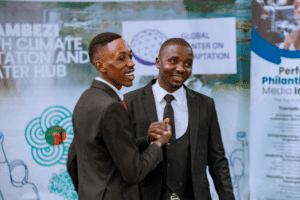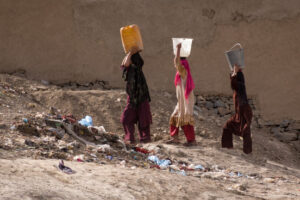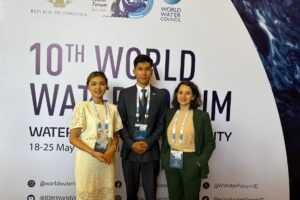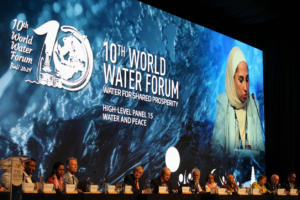Description
Day 2 marked the beginning of the parallel sessions and what a day it turned out to be. Speakers of different backgrounds and expertise led the insightful sessions on a range of topics: communication strategies, youth involvement, water and climate challenges in indigenous communities.
We were also impressed by your participation in the networking session and were pleased to note you asking intriguing questions to the WYPW leadership team and members, and representatives from leading organizations in the water sector.
We thank all the participants who joined in the parallel sessions of the day. It was amazing to hear from experts and representatives from different corners of the world brought together by their common goal and purpose of conserving and utilizing water for the common good for today and tomorrow.
Consult the Arabic version here.
YOUTH COMMIT TO WATER AND PEACE – Host Geneva Water Hub
By Ransford O.Tetteh
Four dialogue groups, consisting of youth and community expert representatives, convened to discuss youth involvement in issues of water and peace in different contexts around the world. In the first group, the national coordinator for Central Asia Youth for Water, Zhaniya Khabullina, explained the devastating effect of one of the world’s worst environmental disasters, the Aral sea disaster. In an attempt to solve this, several initiatives have been embarked on by authorities and policymakers, inter alia, capacity building, and policy developments that do not effectively get the youth working in the local context. Although strides have been made by the older generation in integrating youth, Dinara Ziganshina, the Deputy Director Scientific Information Center of Interstate Commission for Water Coordination in Central Asia, agreed with Ms. Khabullina that there is room for improvement, stressing that the older and younger generation both need to commit to collaborative initiatives like joint training and joint programs.
In the second group Hasmik Barseghyan, President of the European Union Parliament for Water, underlined the power of water as a pressure tool for insecurity in gaining economic or political points in another country and questioned how youth can be considered in diplomatic discussions. In response, Dr. Danilo Turk, the former President of Slovenia, suggested tapping into youth’s potential by encouraging and facilitating self-driven research which capitalizes on youth’s sensitivity to the environment. During the third session, while espousing the contribution of the Middle East and North African (MENA) countries to agriculture and the corresponding need to prioritize water, Ahmed Alboraey of WYPW MENA, indicated that the introduction of agricultural biotechnology brings new focus to the challenge of the brain drain of youth and apathy in the region. Dr. Rabi Mohtar, the dean of the Faculty of Agriculture and Food Sciences at the American University of Beirut, encouraged youth to change their perception of farming as an ancient practice and become involved as biotechnologists who can employ research to reduce agriculture’s water footprint. The last dialogue group highlighted similar views expressed by earlier speakers on the challenges faced by the youth in the water sector but in the Latin American context. Joyce Najm Mendez, the cofounder of the Paraguayan Youth for Water Network, resolved to engage more on the national and regional level to develop youth participation in addressing water insecurity issues.
COMMUNICATION FOR DEVELOPMENT – Host Global Water Partnership CEE
By Tameka Deare
The communications for development parallel session, hosted by the Global Water Partnership of Central and Eastern Europe, aimed to impress upon participants the role of communication in amplifying voices, facilitating active and meaningful participation, and fostering social change. Presenters touched on different aspects of communication in the context of development. Commonly used communication channels, such as Facebook, Youtube, and Google Workspace, were introduced and their benefits and relevant applications discussed. A strategy for developing communication projects was presented that involved determining the goal of communication, considering the audience, defining the message, identifying the appropriate channels, and planning the approach. Participants were apprised of how storytelling could be used to authentically connect with and heal communities in times when facts alone fail to do so. The session also showcased how communication was successfully employed to foster public participation in the management and protection of the Danube River.
Participants were given the opportunity to work in groups to apply the concepts introduced earlier in the session in developing a communication campaign for a mock ‘Save our River’ scenario. This exercise highlighted the importance of measurable goals, distinguishing your communication campaign from others, a winning pitch, appropriate resource distribution and tracking of impact of communication in the preparation and execution of communication projects.
GLOBAL WATER GOVERNANCE – Host Josh Newton
By Syed Nasar Alam
Josh Newton, hosted the Global Water Governance session. The founder of Josh’s Water Jobs and a consultant to the Global Center for Adaptation, introduced the session by stressing the importance of water, stating “We are in the middle of a water crisis”. Problems regarding water such as floods and drought are globally increasing, and the availability of freshwater is decreasing for people. The need for global water governance was emphasized by suggesting that “Freshwater is a global issue” that needs to be addressed. However, differences in political systems make things complicated and the biggest issue is there are no global laws in place – only recommendations are available. Moreover, countries consider this a matter of sovereignty when it comes to having a global mechanism regulating water. But the benefits outweigh these hurdles since there is a need for a unified vision for all to move forward together. Mr. Newton mentioned that the UN water is a good representation of water organization. However, since there is much competition among UN bodies and water is not seen as much of a global issue, very little has been done so far. For example, the UN conference for the midterm comprehensive review of International Decade for Action “Water for Sustainable Development” is expected in 2 years from now, the first conference dedicated to water since 1977. Young members among the participants were encouraged to engage in innovation while adapting to political, economic, and global change as it will be the key for the future generation to enact concrete solutions.
POWER OF YOUNG WOMEN: BUILDING CONFIDENCE – Host Her2O
By Janeth Morales E.
To come
FOCUS AMERICA: INDIGENOUS COMMUNITIES FACING WATER AND CLIMATE CHANGE – Host International Secretariat for Water
By Malaz Suliman
In this session, three indigenous leaders from different American countries talked about their communities and the challenges of water and climate change. Norma Cuba from Choccoro town in the Andes of Peru articulated the importance of water as a strategic issue and related it to the security of her nation. As a female leader, she asked both governments and private institutions for support to carry out plans and programs needed to enhance water and the ecosystem. Meagan Mitchell of Mohawk Council of Akwesasne in Canada discussed the change to her community’s river she witnessed over time. She said that warmer temperatures made the ice freeze later and melt earlier, affecting traditional ceremonies and food cultivation. Ms Mitchell stressed how every decision made will affect the coming generation and stated that “We can’t leave this earth in a bad shape”. Lastly, Russel Huaman of Pachapaq for the Earth Association in Peru, talked about adaptation techniques adopted by indigenous people such as systems of harvesting.
HOW TO GET INVOLVED IN THE WYPW – Host WYPW
By Janeth Morales E.
During the parallel session “How to get involved in WYPW”, conducted by Danielle Kamtié (ISW) and Alex Whitebrook (WYPW), the values (Peace, Equity and Environment), objectives (Raise awareness, Advocate, Local Action and Research) and the seven (7) working groups (Communications, Research, Membership, Local Action, Chapter Coordination, Blue Peace, Events) of the organization were explained. Furthermore, they explained how new members will be involved in new projects and workshops, continue learning and expand the youth network around the world. For example, there are some interventions in Sri Lanka and Nigeria where there is a strong intention to take local action and collaborate with the organization. “Local Action is one of our priorities and we are committed that it should work properly. We continue offering new events and to find committed people from different countries and share ideas and collaborate together for future projects” said Alex Whitebrook (WYPW).



